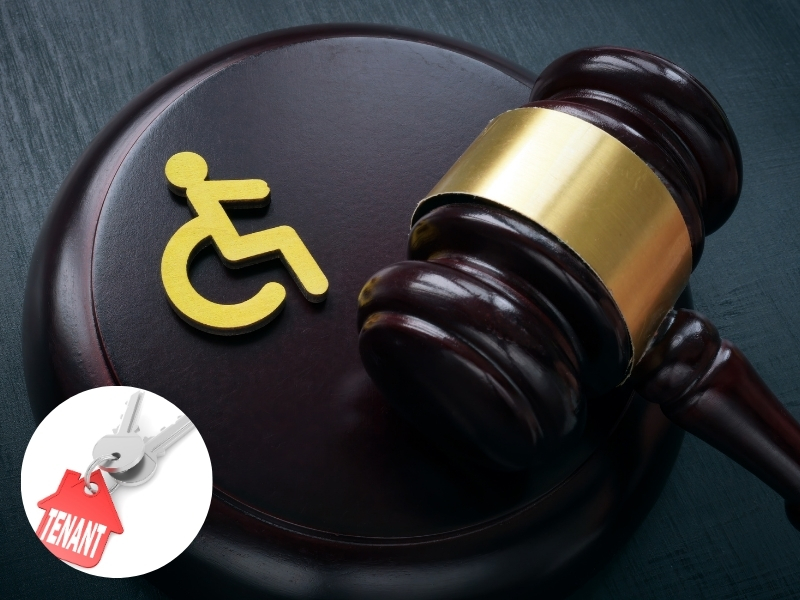
When it comes to renting a property in Australia, all tenants, regardless of their circumstances, have legal rights that ensure fair treatment. However, tenants with disabilities often face unique challenges. Fortunately, Australian law provides several protections for disabled tenants, enabling them to live comfortably and with dignity in rented accommodation. This article will explain the critical rights of disabled tenants under Australian law, the legal protections available, and how tenants can make the most of these laws.
What are the critical rights of disabled tenants under Australian law?
Disabled tenants have the same fundamental rights as other tenants, along with specific laws and protections that address their unique needs. These include:
- Right to access non-discriminatory accommodation: Landlords cannot discriminate against tenants based on disability, whether in a house, unit, or apartment.
- Right to modify the property: Disabled tenants can request modifications to improve independence, especially for mobility or daily needs.
- Right to privacy and security: Disabled tenants have the right to privacy and security, ensuring their personal space is respected.
- Right to fair treatment in lease agreements: Lease terms must be the same for disabled tenants as for others.
How does the disability discrimination act protect disabled tenants?
The Disability Discrimination Act 1992 (DDA) plays a vital role in protecting disabled tenants from discrimination. Here are some of the critical protections offered under this act:
- Protection against discrimination: The DDA prohibits landlords from discriminating against tenants based on any disability, including physical, intellectual, sensory, or psychiatric conditions.
- Equal access to housing: Disabled tenants have the right to equal access to housing, and landlords cannot refuse to rent based on disability.
- Reasonable adjustments: Landlords must make reasonable adjustments to the property or lease terms to accommodate the tenant’s needs, as long as it doesn’t cause undue hardship.
- Access to public and common areas: Disabled tenants can use all areas of the rental property, including common spaces, without discrimination.
What are the rights of tenants with disabilities regarding modifications to rental properties?
One significant challenge faced by many disabled tenants is making changes to their rented homes to make them more accessible. This highlights the importance of accessible housing, as the law permits certain modifications to be made when they enhance a tenant’s ability to live independently. Here are the rights disabled tenants have concerning property modifications:
- Right to request modifications: Disabled tenants can request changes to make the property accessible (e.g., grab rails, ramps, wider doorways).
- Landlord’s obligation: Landlords must reasonably consider requests and cannot unreasonably refuse them, mainly if it improves independence.
- Cost of modifications: Tenants usually cover costs, but some expenses may be shared or funded by programs like NDIS.
- Restoration of property: Tenants may need to restore the property unless modifications are essential for disability.

How can tenants with disabilities request reasonable adjustments in their accommodation?
Landlords make reasonable adjustments to rental properties to help disabled tenants live independently and engage fully in their community. Here’s how they can request these adjustments:
- Make a formal request: Submit a written request to the landlord outlining the needed adjustments and supporting evidence.
- Provide supporting evidence: Offer documentation, like a letter from a doctor or therapist, detailing the required modifications.
- Discuss options with the landlord: Discuss options with the landlord to explore adjustments, costs, and timelines.
What are the liberties of tenants with disabilities in terms of rent and lease agreements?
Disabled tenants have specific rights related to rent and lease agreements that ensure fair and equitable treatment.
- Equal rent terms: Disabled tenants must pay the same rent as others in comparable properties without extra charges due to their disability.
- Fair lease terms: Lease agreements should not discriminate against disabled tenants, with all terms provided equally.
- Rent payments and financial assistance: Disabled tenants may qualify for government assistance or financial support, mainly if they receive NDIS funding.
- Access to support services: Tenants can access NDIS disability support services, such as financial management, to help manage rent and lease terms.
How do tenants with disabilities ensure fair treatment from landlords?
To ensure they are treated relatively by landlords, disabled tenants can take several steps:
- Know your rights: Understand your rights under Australian tenancy laws and the Disability Discrimination Act to avoid discrimination.
- Keep records: Maintain written records of communication with your landlord, including modification requests, for proof in case of disputes.
- Seek advice and support: For guidance and mediation, contact tenancy advocacy services, legal services, or disability support organisations.
- Dispute resolution: Access government or community dispute resolution services if needed.

What legal protections do disabled tenants have against eviction?
Eviction is a serious issue for any tenant, but there are additional protections in place for disabled tenants:
- Protection from discrimination: Landlords cannot evict disabled tenants solely due to their disability. They must provide valid reasons for eviction, such as non-payment or lease violations.
- The eviction process: If facing eviction, landlords must follow legal procedures, and tenants can challenge the eviction in court or a tribunal.
- Reasonable adjustments during eviction: Tenants at risk of eviction may request adjustments, such as extra time to vacate or relocation assistance, to ensure fairness and accessibility.
How can professional accommodation and tenancy assistance support disabled tenants?
Professional accommodation and tenancy assistance services can offer critical support to disabled tenants. Here’s how these services can help:
- Navigating the rental market: Professional services help disabled tenants find suitable, accessible accommodation that meets their needs and complies with accessibility standards.
- Supporting modification requests: Assistance with formal property modification requests and clear communication with landlords.
- Legal assistance: Legal experts from disability support organisations provide advice and representation in disputes with landlords.
- Managing tenancy issues: Support with rent payments, understanding rights, and handling tenancy challenges.
Ensuring equal access for disabled tenants
Disabled tenants in Australia have legal rights and protections that ensure they can live in accommodation that suits their needs. Whether it’s the right to request property modifications or the ability to challenge unfair treatment, tenants with disabilities can access the support they need to maintain their tenancy. Professional accommodation and tenancy assistance can further help by providing advice and support to navigate these laws.
Choosing Choice Care Australia means working with a trusted NDIS provider. We specialise in supporting individuals with disabilities in securing housing and maintaining tenancy. Our tailored approach ensures a smooth, stress-free process, providing confidence and security. Contact Choice Care Australia today to schedule a consultation and learn how we can help you with your accommodation needs.


